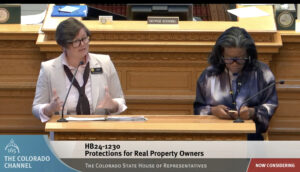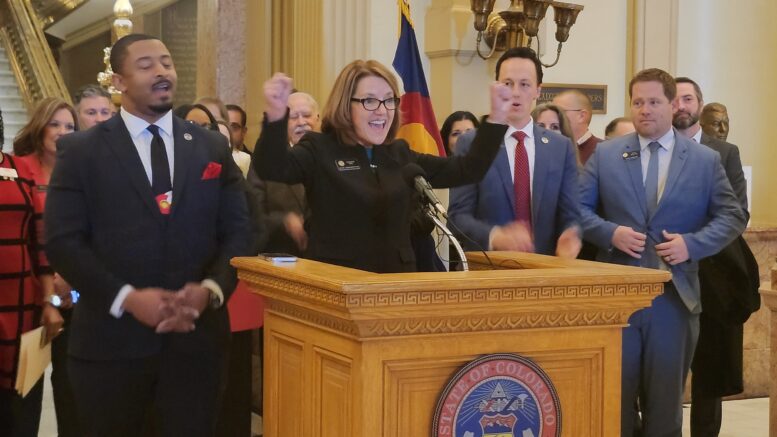Gov. Jared Polis and a bipartisan group of lawmakers rolled out the latest effort to reform construction-defects laws and jumpstart the condominium market Wednesday — a day after opponents introduced a conflicting bill that sets the playing field for this year’s debate.
House Bill 1272, which has bipartisan support, would make it more difficult to file lawsuits over reputed defects in owner-occupied multifamily housing, would offer developers more affirmative defenses against such suits and would prioritize repair over reparations. It mirrors a bill that died in the House last year in some ways but also seeks to re-focus specifically on lower-cost condominiums and “de-risks the market” by providing owners more pathways to resolve disputes more quickly outside the court system.
HB 1261, cosponsored by 11 Democrats, would void provisions in development contracts mandating arbitration before court action, give longer periods for defects claimants to file suit and require courts to award prejudgment interest to prevailing plaintiffs. Supporters said in a news release that the aim is to “to protect homeowner rights from builders trying to avoid responsibility for construction defects.”
The simultaneous introduction of the bills sets up a head-on collision on an issue that has dogged legislators for more than a decade and has taken on more steam as Colorado’s housing costs have become some of the highest in the nation. Condos — typically a lower-priced, entry-level option for home ownership — were 20% of the stock of new Colorado homes in 2008 but represent less than 5% of the total now, and reform supporters blame Colorado’s laws for making it too easy to file defects suits and scaring off condo builders.
Construction-defects bills divide legal camps
Rep. Shannon Bird, the Westminster Democrat who is cosponsoring the reform effort for the second year in a row, said she is driven by those young professionals who can’t afford to buy a home and are stuck paying high rent prices. She noted that 14 apartments are now built for every new condo in Colorado and said HB 1272 will give state residents a critical chance to build wealth through home equity if it can unfreeze the market.
“The bill that we introduced last night has the bold goal of making home ownership a reality for many more Coloradans,” Bird said at a Capitol news conference, flanked by supporters from both sides of the aisle, Democratic House leaders and the Democratic governor. “To the 90% of renters who aspire to own a home someday, hear me now: This bill is for you.”
Meanwhile, HB 1261 supporters put out a news release painting theirs as a bill for homeowners and HB 1272 as a proposal for developers. Where HB 1272 would expand immunity for builders and shorten some timelines for filing lawsuits, HB 1261, sponsored by Democratic Rep. Jennifer Bacon of Denver, will allow neighbors experiencing similar issues to fight for changes and prevent builders from limiting their legal rights, they said.

Colorado state Rep. Jennifer Parenti listens as Rep. Jennifer Bacon speaks on House Bill 1230 during the 2024 legislative session. A new bill from Bacon resembles that bill that died.
“It should be a given that builders will take responsibility for poor workmanship that results in homeowners like me dealing with sinking foundations and flooding basements,” said Janine Musser, a Westminster homeowner and member of Build our Homes Right. “The solution to construction defects is clear — build homes right the first time. A home is the largest investment most of us will ever make, and this bill will give homeowners the assurance that their investment is fully protected.”
Reform bill details
HB 1272 would:
- Raise the bar on filing a construction-defects lawsuit in two ways — requiring 65% of owners in a condo building (rather than just a majority) to vote to do so and mandating that plaintiffs file affidavits from third-party licensed professionals indicating negligence;
- Aid builders in their defense against claims by offering use of more affirmative defenses and by establishing a rebuttable presumption that a property doesn’t have a construction defect when a state agency or local government has issued a certificate of occupancy;
- Require that construction professionals alleged to have created defects offer to settle the claim through repair or explain why the defect does not require repair; and
- Reduce to six years the statute of limitations for bringing defects claims on middle-market housing if builders offer warranties of one year on materials, two years for plumbing/electrical/HVAC systems and six years for major structural components. The bill defines “middle-market housing” as multifamily housing in which each unit is for sale at or below the maximum Federal Housing Administration loan limits in the county where it’s built and has had a third-party inspection.
Polis, who is getting more involved in this bill than any construction-defects reform effort before, said the law must be changed to reduce risk for builders and allow more condos to be built. HB 1272, he said, will “unleash housing supply,” particularly as it focuses not on what homebuilders want but on ensuring prospective homebuyers have options, and it comes with added homeowner protections.

Gov. Jared Polis lauds a new construction-defects reform bill during a Capitol news conference on Wednesday.
“I’m happy that this conversation is underway, and I’m thrilled with the Legislature’s taking up the mantle to make sure we get this done,” Polis said.
New coalition pushing construction-defects reform
Angela Hutton-Hall, managing broker for City Park Realty, later stated that Colorado has a housing shortage of more than 100,000 structures just for its current population that’s made it hard for her to find homes for clients of any age.
Where homebuilders led previous efforts to reduce construction-defects lawsuits — a change business leaders believe will lower the stifling costs of insurance keeping builders away from condos — this effort has a new focus on the needs of middle-class consumers. Speakers at Wednesday’s event included leaders from Colorado Black Women for Political Action, lower-income-focused Clayton Early Learning and the Hispanic Restaurant Association, saying members need a chance to buy homes and build generational wealth.
“Housing isn’t just a roof over our head. It’s about giving families the opportunity to build a future,” said Bianka Emerson, president of Colorado Black Women for Political Action.

Bianka Emerson, president of Colorado Black Women for Political Action, speaks in favor of a construction-defects reform bill during a Capitol news conference on Wednesday.
Colorado Trial Lawyers Association President Sam Cannon responded with a statement that by setting up special protections for builders of middle-market housing, the bill would create a two-tier system where less wealthy homeowners have fewer legal protections.
Opposing bill focuses on homeowner legal protections
HB 1261, by contrast, would:
- Require construction professionals accused of defects to provide claimants with detailed building records including soil reports and engineering calculations, any maintenance and preventive maintenance recommendations and names of contractors who built the home;
- Mandate that courts award prejudgment interest of 8% to prevailing construction-defects claimants — a move that Bacon described through a similar bill that died in 2024 as removing any incentive for developers to try to run out the clock on statutes of limitations;
- Void any provision in real-estate contracts that prohibits group lawsuits against contractors or imposes additional requirements to bring a legal action; and,
- Change the starting time on the two-year statute of limitation for bringing claims from the point where a defect is discovered to the point when a cause of the defect is ascertained.
Backers of HB 1261 reiterated past arguments that Colorado’s existing homeowner protections are among the weakest in the nation, contrasting sharply with opponents’ claims that the state’s laws are the reason for the condo shortage. And they charged that HB 1272 would shorten the statute of limitations further and presume that a certificate of occupancy immunizes builders against defects claims even though city building codes explicitly say their home inspections don’t certify a lack of defects.
“I know firsthand the law already makes it almost impossible for homeowners to hold builders accountable for shoddy construction, and this bill would make it even more difficult for working families while exempting luxury homes,” Musser said.
Asked at the news conference if the two bills were incompatible, Bird said she wasn’t prepared to comment. Meanwhile, Polis, asked if he would veto HB 1261 if it landed on his desk, sidestepped the question and said he was focused on HB 1272 increasing accessibility to more affordable housing.
